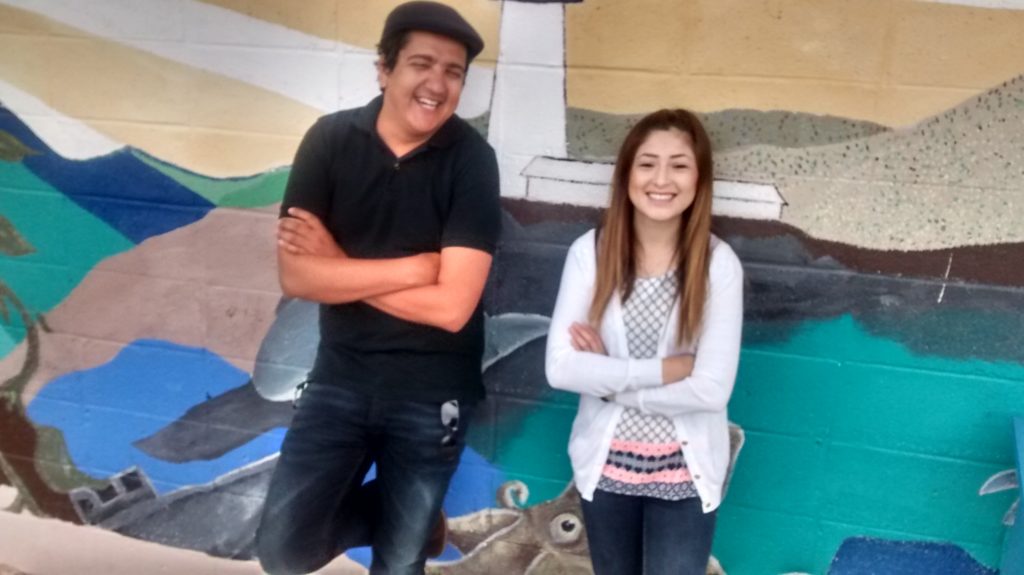Election season has come to Pescadero. And Puente, along with the state of California and the rest of the country, is witnessing a surge in citizenship applications.
“There’s a lot of people applying for citizenship,” says Rita Mancera, Executive Director of Puente. “It’s mostly because of what’s at stake with the elections coming up.”
Citizenship applications always swell during an election year, but this year’s numbers are unusual. In California, the number of citizenship applications from Latinos doubled from January through March, compared to the same time period in 2012. States like New York and Texas are seeing similar trends.
Here on the South Coast, the numbers are modest, but significant. Puente has helped 15 participants start the application process since January, compared with 5 people last year. Many participants are about to apply, or have applied and are waiting for an appointment from immigration authorities. Others have begun studying the long list of civics questions that comprise a portion of the naturalization test. Some others have worked with a Puente tutor to help them prepare.
Many applicants have been permanent residents for a while, and longtime community members. They were in no rush to apply for citizenship … until now.
“Older people tend to either resist become citizens or wait a longer time. Those are mostly the people who are coming in right now,” observes Mancera. Nationally, only 36 percent of eligible Mexicans actually become U.S. citizens, while 68 percent of all other immigrants do, according to the Pew Research Center.
This election represents a political awakening for Marisol Silva. She lives in Pescadero with her husband and young son, who are both U.S. citizens. This year, she decided to apply for citizenship as a way to unite the whole family and assert her right to vote. Silva and her husband are following the November election campaign closely. “The Republicans and the Democrats, there’s a big difference. The Latino voters have to help choose a better candidate,” she says.
She has other reasons, too. Silva is a teaching assistant at Pescadero’s preschool. She is also enrolled at Cañada College, earning credits toward a degree in Early Childhood Education. She’s a straight-A student with a perfect 4.0 GPA. She knows that as a citizen, she would be eligible for academic scholarships.
Alejandra Ortega is a local mom who works at Puente. “As a resident, I was not in a rush to become a citizen. And now I just feel like I need it – to be able to vote and have more rights.” She plans to apply for citizenship this month, and hopes she’ll be in time to vote in the election.
Once she is a citizen, Ortega hopes to run for school board in the La Honda-Pescadero Unified School District. As a citizen, she can do so. Her civic contributions will benefit her entire community.
Even with a green card, the citizenship process is a tall order that requires proving competency in English in addition to passing the naturalization test. It used to take three or four months to get an appointment. With a backlog at immigration offices statewide, it’s now taking six or seven months. It’s a major commitment and costs $680 to apply. That’s a hardship for those with very little disposable income, so Puente will sometimes loan an applicant the money if they don’t qualify for a low-income fee waiver.
Puente’s immigration services extend far beyond citizenship, however. Last summer, Puente obtained Board of Immigration Appeals (BIA) agency recognition, an accreditation that allows certain staff members to file legal papers on behalf of clients who need visas, green card renewals, and help with legal problems, including deportation. Additionally, Puente is a one-stop shop for local youth to obtain and renew their work permits under DACA (Deferred Action for Childhood Arrivals). Dozens have done so.
Puente also educated the community around DAPA (Deferred Action for Parents of Americans and Lawful Permanent Residents) before it was blocked by the courts. Puente helped local mothers and fathers gather all the documents they would need to apply. “It’s absolutely heartbreaking that they’re going to be forced to live as if they are invisible,” Mancera says. “We have mixed-status families where the parents are not citizens and the children are. They’re always living in fear.”

Noel Chavez, right, with Alejandra Ortega
Noel Chavez grew up in such a family. Puente’s Education Director initially came to the U.S. without legal papers when he was seven years old, with his parents, four brothers and seven sisters. The family was fleeing violence in Michoacán. He has been a permanent resident since he was in college.
That’s just one of the reasons why Chavez cares so deeply about politics and the future of this country. “I identify myself with the ‘Dreamers,’” he says. In 2008, he worked with the Obama campaign and went to Nevada to register Latinos to vote in that seminal election.
This summer, Chavez applied for citizenship.
“As a citizen, I know my message is going to be much stronger. I really want to make sure that people know their options. That these elections are important. That if you’re going to be affected by those in power, you need to educate yourself before voting,” he says.
Would you like to support Puente’s legal services or help one applicant with their fee or partial citizenship fee? You can! Click here.


